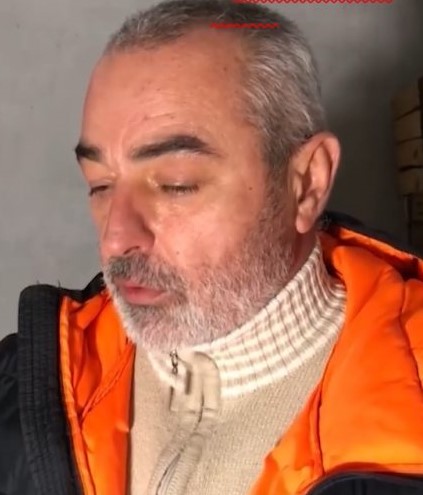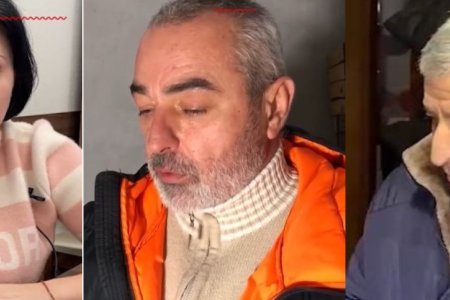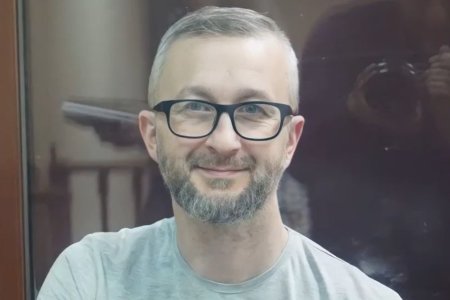
Russia’s Southern District Military Court has sentenced Oksana Shevchenko to ten years’ imprisonment 15 months after she and two other Ukrainians were presented as would-be ‘Ukrainian saboteurs’ on a Russian propaganda channel. The Russian FSB then claimed to have “thwarted a terrorist attack by Ukraine’s Security Service” on one of the Russian-installed ‘leaders of Crimea’. The story was presented as ‘breaking news’ and came with a video supposedly of the three Ukrainians’ ‘arrest’ and a ‘confession’ almost certainly obtained through torture.
The reports on 5 February 2024 asserted that Volodymyr Bodnar (b. 1974); his 45-year-old wife Oksana Shevchenko, and a second man, identified only by surname and initials V.V. Ananiev, had all given ‘confessions’ to involvement in the alleged plot to blow up a car from the so-called ‘Crimean leader’s’ cortege. This was described as ‘a terrorist attack’ organized by the Ukrainian Security Service [SBU]. Although all three were shown, purportedly during the ‘arrests’, only Bodnar was heard giving a so-called ‘confession’. He became flustered in one place, as though unable to remember what he should say, while elsewhere his speech seemed suspiciously smooth, as though he were reciting a learned text. Virtually all Ukrainian political prisoners who have been freed, or who have retracted their ‘confessions’ after receiving access to an independent lawyer, say that they were forced to learn their lines by heart, and faced renewed beatings or electric shocks if they ‘got their lines wrong’. Bodnar says that he was born in Zaporizhzhia on 12 April 1974 and is registered in that city. He was supposedly told by SBU officers to take “an explosive device of American or German make” to Melitopol which he allegedly did. He claims that he cut a hole out of a gas cannister and placed what he calls ‘a mine’ in it, wrapped this in a rag and carried it to Crimea. To do this, he would have needed to pass through some very rigorous Russian checkpoints. According to another Russian propaganda source, Shevchenko asserted that her husband had taken the device to occupied Crimea in May 2023 and hid it in a rented garage. Then in October 2023, he purportedly received SBU instructions to detonate the device near one of the cars in the cortege of one of the leaders of Crimea. They were purportedly planning to carry this out from 26 January to 1 February 2024 but were detained by the FSB.
At the time, it was stated that all three Ukrainians were charged under Article 205 § 2 a, (and Article 30 § 1) of Russia’s criminal code – attempt to commit an act of terrorism, as well as Article 222.1 § 3a (unlawful possession, etc. of weapons, explosive devices, etc.). This was presented as one ‘plot’ with three alleged plotters, although it is now clear that three separate ‘trials’ are being staged.

The charges against Oksana Shevchenko were passed to the Southern District Military Court in Rostov on 6 February 2025. Judging by the number of hearings that did not happen, it seems likely that Shevchenko agreed to plead guilty, perhaps in the hope of getting a lighter sentence.
On 14 May 2025, she was sentenced by ‘judge’ Denis Vasilievich Stepanov to 10 years medium-security imprisonment and to a steep 500 thousand rouble fine. It was claimed that she was part of an organized group which was planning an attack on Sergei Aksyonov, Russian-installed ‘Crimean head’. One of the charges was more serious than that reported in February 2024, with Shevchenko charged with Article 205. § 3b (a terrorist act, but one “leading to the death of a person). It is not clear why this charge is cited as this was an allegedly thwarted attack. The article is also supposed to lead to a sentence of 15 to 20 years’ imprisonment. 'The other member of an organized group” mentioned in a couple of places presumably refers to Volodymyr Bodnar. No mention, however, is made of his trial.
As reported, the third person in this supposed ‘plot’ proved to be Volodymyr Ananiev, a 74-year-old Ukrainian civic activist, who is well-known in Crimea. He and his wife had been living for some time in Kyiv, and is most unlikely to have ever met the couple with whom he was alleged to have been ‘plotting’ to kill Aksyonov.

As well as being Russia’s oldest Ukrainian political prisoner, Ananiev has serious health issues, including high blood pressure, spinal problems, hernias, and has undergone glaucoma and other eye operations. He needs medication on a daily basis with restrictions on such medication or refusal to provide it at all constituting medical torture. Even the FSB did not hide the fact that Ananiev walks with a stick, due to problems with his joints.
It was also unclear why he was seized since, away from the propaganda media, he was charged, for the first ten months, only with ‘the illegal purchase, transfer, sale, possession or movement of explosive devices’ under Article 222.1 § 1 of Russia’s criminal code. In November 2024, however, a second charge was added of abetting in the planning of ‘a terrorist attack’ (Article 205.1).
His ’trial’ is now underway at the same notorious Southern District Military Court, with the court not naming the judge.
Russia’s FSB has been fabricating ‘Ukrainian saboteur’ plots since soon after Russia’s invasion and annexation of Crimea. Of the earlier cases, we have considerable evidence of the methods of torture applied, as well as the ways in which ‘evidence’ was fabricated. There are no grounds for believing the situation to be any different here.
Oksana Shevchenko is the second resident of occupied Melitopol to have been charged over alleged plots to kill Sergei Aksyonov. On 20 August 2024, Ihor Korchynsky was sentenced by the Southern District Military Court to 18 years’ maximum-security imprisonment over another such unproven ‘plot’. The sentence was passed by ‘judge’ Maksym Mihailovich Nikitin, who has already passed several highly dubious sentences against Ukrainians abducted from occupied territory.



